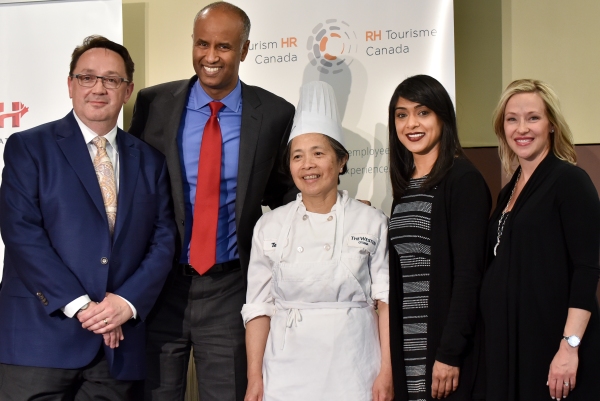 Tourism HR Canada and the Hotel Association of Canada (HAC) applaud the federal government for launching the Employing Newcomers in Canadian Hotels Pilot Project. This three-year pilot program will see nearly $7 million dedicated by Immigration, Refugees and Citizenship Canada (IRCC) to connect newcomers to Canada with jobs in the hotel industry in five regions across the country.
Tourism HR Canada and the Hotel Association of Canada (HAC) applaud the federal government for launching the Employing Newcomers in Canadian Hotels Pilot Project. This three-year pilot program will see nearly $7 million dedicated by Immigration, Refugees and Citizenship Canada (IRCC) to connect newcomers to Canada with jobs in the hotel industry in five regions across the country.
The Honourable Ahmed Hussen, Minister of Immigration, Refugees and Citizenship, and The Honourable Bardish Chagger, Leader of the Government in the House of Commons and Minister of Small Business and Tourism, announced the initiative on World Refugee Day, June 20.
Attendees included members of the Tourism HR Canada Board of Directors, in Ottawa for their June meeting, as well as staff from the event’s host hotel, the Westin Ottawa. The Westin Ottawa cook Tao Huynh was profiled, as she arrived in Canada as a refugee from Vietnam in the 1970s, and has built a successful career at the Westin while raising a family of four children, now adults with their own careers.
“We are delighted to partner with the Government of Canada and Tourism HR Canada on this exciting program that will help people new to Canada join our industry,” said Susie Grynol, President of the HAC. “This is a win-win for newcomers and hoteliers. Those employed through the program will have an opportunity to obtain work experience that will help them develop critical skills as well as room to grow, while Canadian hotels can address job vacancies.”
This pilot program is one of the first through IRCC’s $32 million dedicated funding stream for service delivery improvements and innovations made under the government’s settlement program. This initiative will assist up to 1,300 unemployed or underemployed newcomers to secure a range of hotel jobs, including both entry level and management positions.
Tourism HR Canada President Philip Mondor sees this initiative as the right fit at the right time. “The innovative model we’ll be deploying for this initiative targets key challenges faced by both employers and new employees. A common challenge often referenced by employers is that newcomers often do not possess the language skill level necessary to properly engage in the training and other onboarding activities they will be subject to. This project addresses that issue head-on: providing contextualized language skill training is a core component of the model being implemented,” states Mondor.
More than 10% of tourism jobs go unfilled because of labour market issues. Projections show that demand for workers will exceed supply for the majority of occupations in the accommodations industry, from frontline positions to supervisors and managers. The tourism industry is a powerful economic driver across Canada, representing $41.2 billion of Canada’s GDP in 2017. This new program will help to rebuild lost economic opportunity from unfilled jobs.
“The advantage of working in hotels is more than just the simple fact that jobs are available. Hotel jobs are a springboard to build a lifelong and fulfilling career,” concluded Grynol. “Hotels offer a variety of positions, strong upward mobility, training, and investment in employees. When you work in a hotel you quickly improve language and customer service skills and learn cultural nuances. There is no better place to cultivate these skills than working in a hotel environment.”
For highlights of the project announcement, watch this video.

